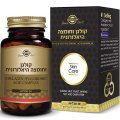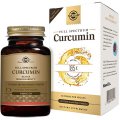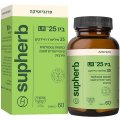Supherb - Bio Plus Probiotic
"Vitamin-Global" is proud to present Bio Plus probiotics, a unique formula in the field of probiotics. This formula, developed by SupHerb scientists, contains very high concentrations of "friendly" microorganisms, which help to maintain a balanced intestinal ecology.
The term "probiotics" stems from the Greek language and means `for life`. It relates to "friendly microorganisms", such as Lactobacillus and Bifidobacterium, which are important for maintaining the digestive system`s microbial balance.
The growth and proliferation of these "good" microorganisms in the digestive system are indispensable for the body`s cleaning processes and healthiness. Research has shown that probiotic supplementation results in a rise in the number of these "good" intestinal microorganisms, while at the same time lowering the number of pathogenic bacteria.
Many scientific studies provide evidence for the enormous importance of probiotics consumption, while emphasizing the relationship between the lack of a balanced intestinal ecology as a result of improper nutrition or mental stress, and various diseases, such as colitis, irritable bowel syndrome (IBS), various hormonal disorders, Candida infections, dermatological problems, etc.
Probiotics present an important nutritional supplement that should be taken for general health and not only if indicated for reasons directly or indirectly related to taking antibiotics.
Probiotic supplementation contributes extensively to our health, beginning from the treatment and prevention of digestive problems such as diarrhea, constipation, stomach ulcers and infective intestinal diseases, to dermatological problems, vaginosis, improved absorption of essential nutritients, elimination of molds by renewing the intestinal population, and strengthening and support of the immune system.
Main uses
Regulation of activity of digestive system
A balanced intestinal flora protects health and helps to correct various digestive problems. It contributes to improved absorption of essential nutritients, adequate functioning of the intestine and immune system, and effective metabolism.
Maintaining intestinal hygiene
A balanced intestinal bacterial population produces organic acids, creating an acidic environment that prevents contamination of the digestive system and prevents the growth of pathogenic bacteria, molds and yeast in the large intestine. Furthermore, certain natural antibiotic-like substances are produced that stop the proliferation of various pathogenic factors.
Strengthening the immune system
Consumption of probiotics stimulates phagocytic processes in white blood cells.
In a recently published study the ability of probiotic supplementation to stimulate the immune system and to improve the cellular immune response was tested. The blood test results of the research subjects after probiotic treatment demonstrated a significant better functioning of the tested parameters of the immune system. A general increase in the number of T-cells, lymphocytes and phagocytic capacity was measured (1). Another recent study, which continued for 7 months, measured whether continuous consumption of probiotics could prevent respiratory and digestive tract infections among kindergarten children. The study results showed significant differences between the two groups:
* There were fewer absences due to illness among the children who took probiotics.
* In the probiotic group a 17% decrease was observed in the number of children suffering from complicated infections of the respiratory system and infections of the lower respiratory tract.
* The effect of probiotics, though moderate, was consistent and improvements were seen in all cases where they were taken.
Increased availability of nutritients
Intestinal microorganisms produce certain vitamins, such as biotin, vitamins B3 and B6, and folic acid. Furthermore, these microorganisms play a role in the initial stages of protein digestion and in increasing lactose tolerance.
Studies have shown an improvement in digestive processes and symptoms of food intolerance, such as foul smelling breath, bloated feeling, gases and bellyaches.
Harm reduction and fewer adverse drug effects as a result of antibiotic administration
Antibiotic treatment is accompanied by many adverse effects, including damage to regular food digestion and growth of intestinal, vaginal and anal Candida molds, which in turn cause damage to the immune system and general health under formation of swellings and gases.
Probiotics consumption during and after antibiotic treatment considerably reduces these adverse reactions.
The currently accepted treatment against H. pylori bacteria consists of a specific antibiotic cocktail to be taken 3 times daily for one week. Although this "cocktail" forms an effective treatment, it is accompanied by adverse reactions and damage to the ecological balance of the intestine and intestinal mucous, which often is already injured under these circumstances.
A recently published study in Digestion demonstrates that probiotic supplementation with Lactobacillus to antibacterial treatment against H. pylori bacteria has a strongly supportive effect by increasing physical tolerance to the antibiotic cocktail and increasing the efficacy of the treatment while at the same time reducing its damage.
Support during pregnancy and breastfeeding and prevention of food allergy and ear infections in babies.
Consumption of probiotics during pregnancy and breastfeeding plays a part in easing digestive problems of pregnant women, prevents formation of hemorrhoids, alleviates digestive problems of the newborn baby and, according to a recent study, can ease and even prevent food allergies in newborn babies.
This new study proves that supporting the intestinal flora by means of probiotics prevents the recurrence of middle ear infections in children and helps to prevent the development of resistance to antibiotics of dangerous bacteria. A recently published study in The Lancet shows that consumption of probiotics by pregnant and breastfeeding women helps to prevent allergic sensitivity in children during their entire life. But the most important fact emerging from this study is that children who received probiotics have a 2-fold lower risk of developing skin allergy than children in the placebo group. In addition, the investigators mention that intestinal bacteria play an important role in strengthening and maintaining the immune system.
Reducing the probability of developing colon cancer
A rich population of "good" microorganisms reduces the formation of carcinogenic substances by "bad" bacteria, thus diminishing the risk of developing colon cancer.
Detoxification
Consumption of probiotics helps to eliminate pathogenic substances and to suppress pathogenic bacteria found in food. Removing toxic substances from the intestine is of great sanitary and cosmetic importance.
Those bacteria that are present in the greatest numbers win the "bacterial struggle" taking place in our body, and therefore maintaining a constant high level of "friendly" bacteria is of the utmost importance to our health. By definition these microorganisms are not pathogenic, and simultaneous consumption of a number of these bacterial strains creates a preferred environment in the host intestine, while creating a hostile environment for pathogenic factors.
About the ingredients
There are many different strains of friendly microorganisms.
The present formula contains the most essential and best studied strains, all of which are lactic acid bacteria, i.e., those that produce lactic acid as the main product of carbohydrate metabolism, creating an acid environment that is inhibitory to the action of undesirable and harmful organisms.
Lactobacillus acidophilus
This bacterium is a natural inhabitant of the large and small intestine in the human body. It is found in human and animal intestines and in the mouth and vagina of humans. It increases and enables the proper digestion of lactose by formation of lactase enzyme; helps to digest food; inhibits and impairs the action of undesirable microorganisms in the intestine by formation of lactic acid and specific competitive inhibition of their products and helps to destroy harmful bacteria by producing a natural antibiotic substance. Certain strains of lactobacillus acidophilus are able to lower cholesterol levels.
Lactobacillus bulgaricus
This microorganism is important for human ecology. In combination with Streptococcus thermophilus it is used to compose the culture from which yogurt is made; it improves the digestion of lactose by producing the enzyme lactase. Certain strains of this microorganism produce a natural antibiotic.
Streptococcus thermophilus
This anaerobic microorganism lives under aerobic or anaerobic conditions; it improves the digestion of lactose by producing the enzyme lactase at even higher levels than Lactobacillus bulgaricus. Certain strains of this microorganism produce a natural antibiotic.
Lactobacillus bifidum
Is found both in the large and small intestine. Helps to prevent the growth of pathogenic bacteria, molds and yeasts and in lactose digestion by synthesizing the enzyme lactase. Lactobacillus bifidum is one of the main groups of "good" microorganisms in the flora of the large intestine. This population of microorganisms decreases with age as well as during disease and its supplementation is therefore important.
Contents:
Each capsule of SupHerb Bio Plus probiotics contains at least 6 billion viable bacteria:
L. acidophilus.........1.5 billion viable microorganisms
L. bulgaricus..........1.5 billion viable microorganisms
B. bifidum..............1.5 billion viable microorganisms
S. thermophilus......1.5 billion viable microorganisms
Recommended dose: 1-2 capsules daily together with a meal.
SupHerb Bio Plus probiotics is available in packages of 60 capsules.
Storage instructions The preparation is very stable in the cold and in the shade. After opening, however, it is recommended to store it in the refrigerator.
Made in Israel
Remarks
* The preparation contains bacterial strains of high quality that supply more than a billion organisms per gram with proven capacity to maintain the hygienic balance of the digestive system. The primary source of the formula strains is obtained from 2-6 months old, exclusively breastfed, babies.
* A protein coating, applied to the microorganisms by a patented procedure, protects them against the acid environment of the stomach, enabling their transfer and attachment to the large and small intestine without decreasing their bioavailability. The protein used for this patented coating procedure is tasteless, water-soluble and devoid of any mutagenic, carcinogenic or allergenic properties.
* The preparation is designated GRAS (Generally Recognized As Safe) by the FDA and the Center for safe and Applied Nutrition.
Pregnant or breastfeeding women, as well as individuals taking prescription medications, should consult a healthcare professional before use. Keep out of reach of children.
This information is not intended to replace professional medical advice.
- Barcode: 7290001697658
- Shipping Weight: 0.2kg
- Manufactured by: SupHerb - Natural Food Supplements
There are currently no product reviews.







